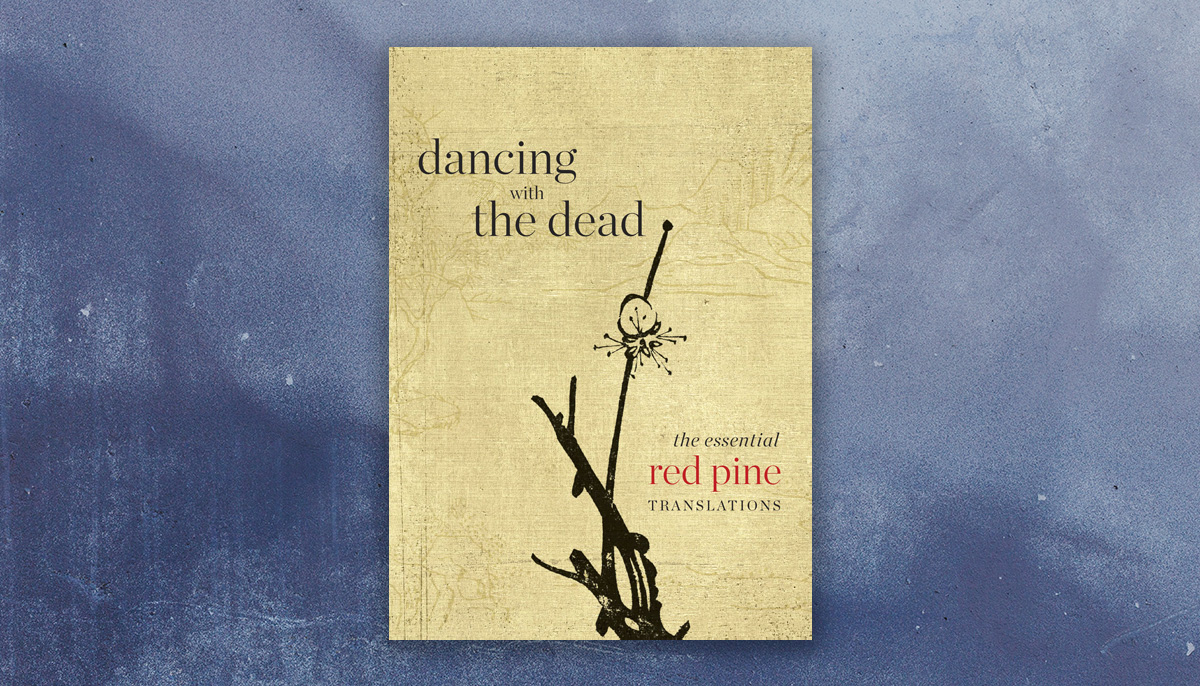This excerpt from Dancing With the Dead: The Essential Red Pine Translations — reviewed in the Summer 2023 issue of Buddhadharma: The Practitioner’s Guide — is provided courtesy of the publisher, Copper Canyon. We thank Copper Canyon for sharing this with Buddhadharma‘s readers, and we thank our readers for supporting dharma publishers.
From Dancing with the Dead
If you have never heard of Stonehouse, you aren’t alone. Few people have, even in China. Back in the early 1980s when I was translating the poems of Hanshan, one of the editions I was using included the poems of a Buddhist monk. When I reached the end of Cold Mountain’s poems, there was Stonehouse waiting for me. I couldn’t believe my good fortune. I was captivated, and yet I couldn’t find anyone in Taiwan who had heard of him. Undeterred, after I finished with Cold Mountain’s poems, I translated those of Stonehouse as well and, in 1986, published them in a string-bound edition with my friends at Empty Bowl and later in a regular trade edition, first with Mercury House, then with Copper Can-yon. Of all the poems I have translated, those of Stonehouse are still my favorite. I’m not alone. W.S. Merwin told me he kept them on his bedside table for years.
Unlike with Cold Mountain, we actually know something about Stonehouse. He was born in 1272, not far from where the Yangzi empties into the East China Sea, and his family was sufficiently well-off that he was educated. He even planned to take the exams that might have led to a career as an official. But his life among his educated peers did not last long enough for him to find out. When he was twenty, he quit his studies and became a novice monk. After three years of training, he was formally ordained and given the name Qinggong 清珙. But the name by which he became known wasn’t Qinggong. It was Stonehouse (Shiwu 石屋). It was the name of a famous cave at the edge of the town where he grew up, and it was not uncommon for people to be referred to by the name or some feature of their hometown.
Being a young monk, Stonehouse did what many young monks did and still do: he sought instruction elsewhere, first with Gaofeng 高峯 on Tianmushan, west of Hangzhou, then with Ji’an 及安 on Chuzhou’s Langyashan, west of Nanjing. When Ji’an was later asked to take over as abbot of a monastery near Huzhou 湖州, Stonehouse joined him, at least for a while. Eventually, Stonehouse decided he preferred mountains, and he found one to his liking a day’s hike to the south. It was called Xiamushan 霞幕山 (Sunset Screen Mountain). The year was 1312, and he was forty. For thirty-three of the next forty years, he lived at the summit, leaving only once, for a seven-year period, to become abbot of a monastery sixty kilometers to the east.
In the spring of 1352, in recognition of his fame among Buddhist monks, the empress presented Stonehouse with a robe woven from golden thread. She must have known he was ill. He died later that autumn. His cremated remains were placed inside a stupa near his old hut, and the information I have summarized above is from its inscription.
After publishing his poems in that first string-bound edition, I began thinking about visiting the place where he wrote them. But it wasn’t until five years later that I had the chance. I was gathering material south of the Yangzi for a series of English-language programs for a Hong Kong radio station in the fall of 1991 and traveling with my Empty Bowl friends Finn Wilcox and Steve Johnson. When we finally reached Huzhou, I knew Stonehouse’s mountain was south of town, but I didn’t know exactly where. I figured we would buy tickets on the next bus headed in that general direction and wing it. But while we were waiting, a crowd of onlookers gathered, and the stationmaster suggested we wait in his office. While our host left to get us some tea, I looked at his walls. On one of them was a topographic map of the entire county. It took me less than thirty seconds to find Xiamushan. The name was still the same. When the stationmaster returned, I pointed to the map. Not only did he refund our tickets, he hired a taxi to take us there.
It was slow going, but once the driver learned which mountain was Xiamushan, we started up a narrow dirt road, and he managed to keep his battered Polish Škoda sedan going far beyond where sense would have suggested he stop. Finally, just below the summit, a chain and a set of block-house buildings barred our way. While our driver parked his car, we climbed over the chain and started up a trail that led the rest of the way to the summit.
A few minutes later, we were there—not that we had a better view. The bamboo was so high, we couldn’t see past it. All we could see was a metal tower and a big metal dish and a cement bunker, from which half a dozen soldiers came running with rifles pointed in our direction. As they surrounded us, the base commander came puffing up the trail from one of the blockhouses below. I explained that we were looking for traces of a monk who had lived on the mountain six hundred years earlier—which in China isn’t such a silly thing to say as it sounds. I showed him the Empty Bowl edition of my translations, which included the Chinese text. His eyes widened, and he smiled. He waved the soldiers away, pulled out his machete, and led us straight into the bamboo.
Half an hour later, we reemerged at a small farmstead and open vistas. The commander said that before the telecommunication base was built, the farmhouse was the only structure on the mountain. As we approached, a farmer appeared in the doorway. He said the place was originally a small Buddhist temple whose monks had been forced to leave during the Cultural Revolution. In the six hundred years since Stonehouse lived there, the place hadn’t changed much. The roof was now covered with tiles instead of thatch, and the walls were made of piled rocks instead of mud and woven bamboo slats. But the dirt floor was the same dirt floor, and the spring that formed the pond Stonehouse called Sky Lake still flowed from the rocks in back.
The farmer invited us inside for a cup of tea. He lived there alone, he said. His children had grown up, and his wife had moved down to the village at the foot of the mountain, where life was easier. He had been living at the summit by himself, he said, for the past twenty years. Like Stonehouse, he didn’t have much to say. Neither did we. All we could do was smile.
from The Mountain Poems of Stonehouse
1
I made my home west of the Cha
where water fills Sky Lake and the moon fills the stream
strangers are frightened by the mountain’s heights
but once they arrive they know the trail
dried snail shells on rock walls
fresh tiger tracks in the mud
I leave my door open when spring days get longer
when paulownias bloom and thrushes call
Note 1: The Cha River flowed past Xiamushan, through Huzhou, then into Lake Taihu. Sky Lake is the pond formed by the spring behind Stonehouse’s hut.
16
A white-haired Zen monk with a hut for my home
my robe has been torn into rags by the wind
down by the stream I rake leaves for the stove
after a frost I wrap a mat around the orange tree
ultimate reality isn’t created
ready-made koans aren’t worth a thought
I sit by my open window all day
looking at mountains without lowering the shade
Note 16: Since this is the only mention of an orange tree, I assume Stonehouse was too late with the mat. Citrus trees don’t do well along this part of the Yangzi. During the Song dynasty, Zen masters started using examples of earlier masters’ enlightenment (gong’an in Chinese, koan in Japanese), or phrases culled from such accounts, as means to awaken their disciples.
28
A friend of seclusion arrives at my gate
greeting we pardon our lack of decorum
manes of white hair more or less tied
monk robes somehow covering our frames
embers of leaves at the end of the night
howl of a gibbon announcing the dawn
sitting on cushions wrapped in quilts
words forgotten we finally meet
48
Examine the patterns of transient existence
the outcome of a game of chess isn’t fixed
a monk in the mountains needs to be free
people in the dust grow old unaware
windblown tea smoke floats above my bed
stream-borne petals fill the pond outside
with thirty-six thousand days
why not spend a few staying still
57
Followers of the Way are done with reason
wherever they look is the light of the mind
somewhere peach trees are blooming
their petals perfume the stream
deep grass is bliss for a snake
sunshine is butterfly heaven
one day I heard a woodcutter mention
a lean-to in the clouds
Note 57: The reference to Tao Yuanming’s “Peach Blossom Spring” is about tracing peach petals upstream to an unspoiled world. This poem likely recounts the first time Stonehouse heard about Xiamushan.
60
Reasoning comes to an end
a thought breaks in the middle
all day nothing but time
undisturbed all year
clouds come and go on a deserted mountain
in a clear sky the moon is a lonesome O
even if yoga or alchemy worked
it couldn’t match knowing Zen
From Dancing with the Dead: The Essential Red Pine, copyright 2023 by Bill Porter, used by permission of Copper Canyon Press, www.coppercanyonpress.org.
For more on the latest dharma books, read this issue’s edition of Buddhadharma on Books. Or see more excerpts and other digital exclusives for Buddhadharma readers here.

